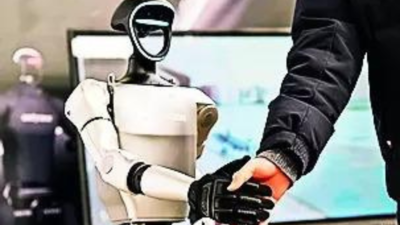
A man shakes hands with a humanoid robot from Unitree (AFP photo)
When
Chinese President Xi Jinping
gathered two dozen of the nation's business leaders for a summit last week, one of the surprise attendees was a little-known, 34-year-old robot pioneer.
Wang Xingxing
, chief executive officer of
Unitree Robotics
, was seated in the first row in front of Xi, more central than celebrated founders such as Alibaba Group's Jack Ma and Tencent's Pony Ma. The country's state media showered him with attention after the summit, which included a coveted handshake with Xi.
Wang - whose startup makes robots agile enough to dance, work and perform kung fu - is having a moment. Beyond the Xi summit, Unitree was featured in a Carnegie Mellon University research project on robots that perform like Lebron James and other top athletes. Meta is discussing cooperating with the company, Bloomberg News reported. And Unitree machines joined humans for a dance extravaganza on one of China's most prestigious programs, the official CCTV's Super Bowl-like Lunar New Year special in Jan.
Wang has said
humanoid robots
are evolving faster than even he expected, and such products may become widely deployed in service and manufacturing sectors by 2027.
Unitree has the potential to do for China's robotics sector what DeepSeek did in artificial intelligence. Wang and his team have pulled off technological breakthroughs at relatively low cost - with parallels to what DeepSeek did - raising the potential for China to field throngs of robots for industrial, commercial and even military use.
Some American politicians have expressed concerns that such machines may threaten the country's business and defense interests. In a Wall Street Journal column last year, US lawmaker Katie Britt and Jacob Helberg, then-commissioner of the US-China Economic and Security Review Commission, wrote that Washington must act swiftly to curb the threat of Chinese robots. They name-checked Unitree for its advances.
"Humanoid robots will have both defensive and offensive national-security implications," they wrote. "The US military is exploring ways to incorporate humanoids into modern warfare, but China has already deployed armed robotics to the battlefield. If the US falls further behind in such critical technology, our troops will face fatal disadvantages on the battlefield."
In response to requests for comment, Unitree said, "Our products are made for civilian use and we don't engage in any uses of our products for military purposes." It also pointed to a joint statement from 2022 in which firms including Unitree and Boston Dynamics pledged not to weaponise their robots.
Wang got an early start in robots. A native from the southern Chinese city of Ningbo, he designed his first robotic dog, XDog, when he was pursuing a graduate degree between 2013 and 2015 at Shanghai University, according to the Late Post interview. He and founded Unitree in 2016 when he started to get inquiries from both potential buyers and investors for XDog.

 1 month ago
15
1 month ago
15










 English (US) ·
English (US) ·